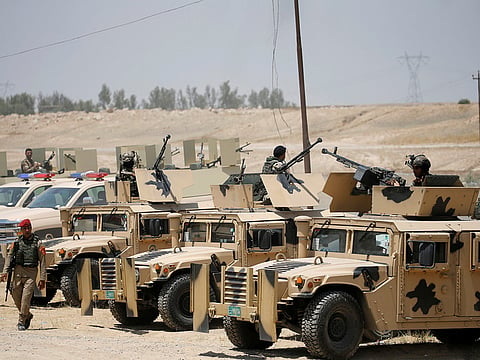Assault on Fallujah takes pressure off Al Abadi
Iraqi prime minister can present himself as a commander — but the relief is temporary at best

Baghdad: Iraq’s operation to recapture Daesh bastion Fallujah has given Prime Minister Haider Al Abadi a political reprieve, drawing attention away from repeated setbacks to reform efforts that have angered protesters.
With the launch of the operation, Al Abadi can present himself as the commander-in-chief who is fighting back against the reviled Daesh, as opposed to a premier whose office was stormed by demonstrators just a few days ago.
Dressed in a black uniform of a type worn by Iraqi special forces, Al Abadi visited the command centre for the operation to retake Fallujah, a Daesh stronghold just 50 kilometres from Baghdad.
Pictures of Al Abadi with commanders were posted on his Twitter account along with the text: “The prime minister oversees and directs the battles” from the front lines.
But not everyone was convinced by Al Abadi’s performance, and some critics said he had the Iraqi flag on the wrong side of his uniform.
“For Al Abadi, Fallujah provides not just a distraction but, if executed well, a demonstration of some level of effective command and control from Baghdad,” said Patrick Skinner, a former CIA case officer who is now with The Soufan Group consultancy.
It is “not the same as good governance, but he needs whatever he can get right now,” Skinner said.
Zaid Al Ali, a fellow at Princeton University and the author of “The Struggle for Iraq’s Future,” said the operation could aid Abadi, but only for a while.
“The Fallujah campaign offers Al Abadi a reprieve from the political crisis in Baghdad, but it is temporary at best,” said Al Ali.
“Regardless of how successful the assault against Daesh in Fallujah will be, Iraqis will continue to demand dramatic reform,” he said.
But for Al Abadi, even a temporary reprieve is a significant improvement.
Last Friday, demonstrators broke into Baghdad’s fortified Green Zone, where the government is headquartered, for the second time in less than a month, storming his office after doing the same at parliament in late April.
The demonstrators were demanding the current government be replaced by technocrats — a measure proposed by Al Abadi but opposed by powerful political parties that rely on control of ministries for patronage and funds.
While security forces largely stood by during the first Green Zone breach, they took tougher measures the second time, using tear gas, sound bombs and water cannons against protesters.
Forces also fired a large number of live rounds, most in the air, but at least two protesters died of bullet wounds while dozens more were injured, the majority by tear gas.
Al Abadi was thus facing protesters enraged by the deaths and injuries they suffered, demanding a new government that would have to be approved by a parliament that has not met in weeks.
Even before the Green Zone breaches, parliament had repeatedly failed to approve new ministers, only signing off on some of Al Abadi’s nominees in a session from which some lawmakers were barred — a move now facing a legal challenge.
But now, all eyes are on Fallujah, which has been outside Baghdad’s control for nearly two-and-a-half years, falling to antigovernment fighters in January 2014 and later becoming a Daesh bastion.
Abadi said the Fallujah operation had been in the works for months but was delayed by political turmoil in Baghdad.
“Political problems and also the events ... threatening security inside Baghdad delayed some of the preparations,” he said in televised remarks.
But powerful Iran-backed militias may have helped force the issue by deploying fighters to the Fallujah area.
However it came about, the fight for Fallujah brings an immediate opportunity for Al Abadi to project a stronger image.
Al Abadi “spent the first two weeks of May getting beaten over the head on Iraqi talk shows by just about every other faction for being weak,” said Kirk Sowell, a Jordan-based political risk analyst who is the publisher of ‘Inside Iraqi Politics’. “Appearing in a military-style uniform, surrounded by men in uniform, to order an operation against Fallujah, this is just what Al Abadi needed.”
Sign up for the Daily Briefing
Get the latest news and updates straight to your inbox



